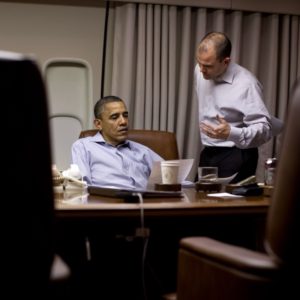David Samuels has recently published a profile of Ben Rhodes, U.S. President Barack Obama’s deputy national security adviser for strategic communications. The lengthy New York Times Magazine piece is essential reading for anyone looking to gain a deeper understanding of Obama’s foreign policy machine.
Many people have already weighed in and more commentary is sure to come. Writing for The Washington Post, Carlos Lozada convincingly slams both Rhodes and (the pathetically sycophantic) Samuels. Over at Foreign Policy, Thomas Ricks has written a very good piece about the profile.
Here’s Ricks:
Rhodes comes off like a real asshole. This is not a matter of politics — I have voted for Obama twice. Nor do I mind Rhodes’s contempt for many political reporters: “Most of the outlets are reporting on world events from Washington. The average reporter we talk to is 27 years old, and their only reporting experience consists of being around political campaigns. That’s a sea change. They literally know nothing.”
But, as that quote indicates, he comes off like an overweening little schmuck. This quotation seems to capture his worldview: “He referred to the American foreign policy establishment as the Blob. According to Rhodes, the Blob includes Hillary Clinton, Robert Gates, and other Iraq-war promoters from both parties who now whine incessantly about the collapse of the American security order in Europe and the Middle East.” Blowing off Robert Gates takes nerve.
With a concise opening paragraph, Bloomberg View columnist Eli Lake summarizes the profile nicely:
Poor Ben Rhodes. President Barack Obama’s foreign policy message guru inhabits a world filled with groupthinkers and militarists. If only he could reason with them. But the establishment doesn’t care for reason. So Rhodes must create an echo chamber, spinning stories to the press and shading the truth to prevent our nation’s next disaster.
So what have we actually learned?
The Rhodes profile is even more revealing if one considers Jeffrey Goldberg’s massive Atlantic piece about American foreign policy under Obama’s watch. In certain ways the two articles are quite different, although some of the similarities are hard to ignore. For starters, unbridled arrogance and utter disdain for Washington’s foreign policy establishment permeate both articles. Like Obama, Rhodes seems to believe that he’s just so smart, so undeniably brilliant that it’s amazing anyone is able to keep up with him intellectually.
Frankly, it’s surprising that a “Boy Wonder” like Rhodes would have said so much of this stuff on the record. Perhaps he’s less cautious now that Obama’s tenure is coming to a close. Rhodes’s claim to have essentially manipulated the media regarding the Iranian nuclear agreement should concern everyone. Besides, let’s look at some of Obama’s other foreign policy “accomplishments.” The openings to Burma and Cuba. All that talk about how “the tide of war is receding.” Syria, or for that matter, Obama’s entire approach to the Middle East. Is history really poised to judge the Obama presidency kindly?
Communications and smart messaging are essential parts of U.S. foreign policy, but what comes out of the Rhodes profile looks a lot more like deception or outright dishonesty. The reality is that Obama’s approach to world affairs leaves a lot to be desired and that much of what he considers to be his preeminent achievements could fall apart in the coming years.
To conclude, this New York Times Magazine article should bother people on the left and the right. It’s yet another reminder that Obama’s team runs on healthy doses of narcissism, myopia and deception. These are not people who are going to be admitting to any serious mistakes because they don’t think they make mistakes. These are not people prone to careful reflection because they’re just that sure that they’re pretty close to flawless. In essence, these are not the kind of people Americans should want to hold power – now or ever again.

